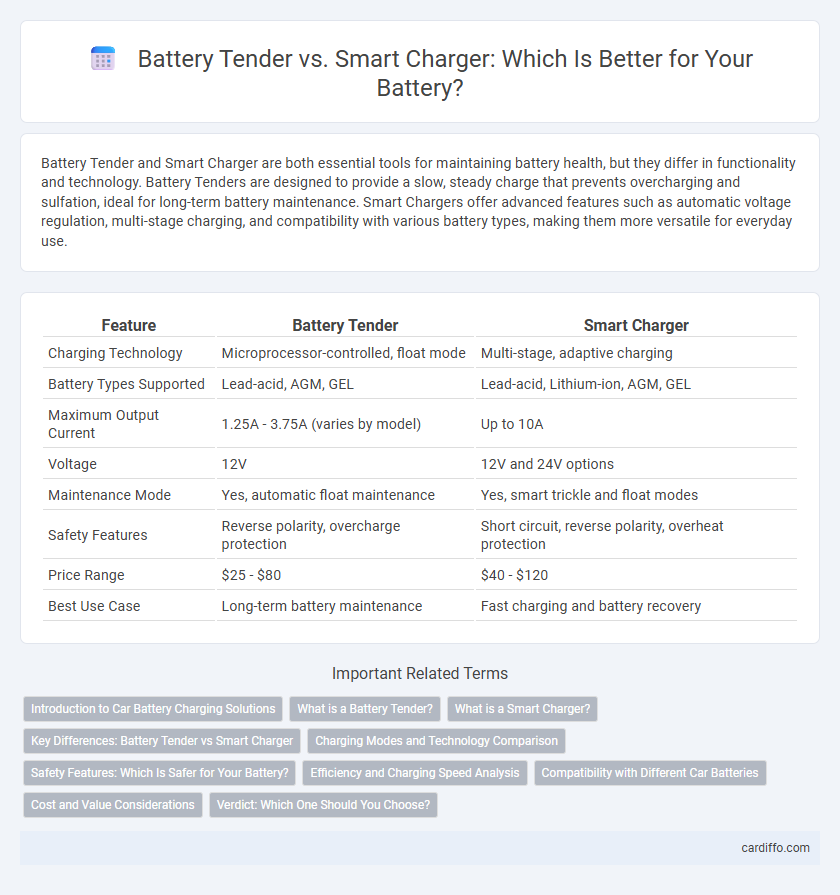Battery Tender and Smart Charger are both essential tools for maintaining battery health, but they differ in functionality and technology. Battery Tenders are designed to provide a slow, steady charge that prevents overcharging and sulfation, ideal for long-term battery maintenance. Smart Chargers offer advanced features such as automatic voltage regulation, multi-stage charging, and compatibility with various battery types, making them more versatile for everyday use.
Table of Comparison
| Feature | Battery Tender | Smart Charger |
|---|---|---|
| Charging Technology | Microprocessor-controlled, float mode | Multi-stage, adaptive charging |
| Battery Types Supported | Lead-acid, AGM, GEL | Lead-acid, Lithium-ion, AGM, GEL |
| Maximum Output Current | 1.25A - 3.75A (varies by model) | Up to 10A |
| Voltage | 12V | 12V and 24V options |
| Maintenance Mode | Yes, automatic float maintenance | Yes, smart trickle and float modes |
| Safety Features | Reverse polarity, overcharge protection | Short circuit, reverse polarity, overheat protection |
| Price Range | $25 - $80 | $40 - $120 |
| Best Use Case | Long-term battery maintenance | Fast charging and battery recovery |
Introduction to Car Battery Charging Solutions
Battery tenders provide a steady, low-voltage charge designed to maintain car batteries over long periods without overcharging, making them ideal for seasonal vehicle storage. Smart chargers use microprocessor technology to analyze battery conditions and supply optimal voltage and current, improving charging efficiency and extending battery lifespan. Both solutions enhance car battery health but differ in functionality, with battery tenders focusing on maintenance and smart chargers on active charging cycles.
What is a Battery Tender?
A battery tender is a specialized charger designed to maintain a battery's charge over extended periods without causing overcharging or damage. It delivers a low, steady current to keep the battery at optimal voltage, ideal for long-term storage of vehicles and equipment. Unlike traditional chargers, battery tenders automatically switch to a maintenance mode to preserve battery health and extend lifespan.
What is a Smart Charger?
A smart charger is an advanced battery charger equipped with microprocessor technology that monitors and adjusts the charging process to prevent overcharging and extend battery life. It uses multi-stage charging cycles, including bulk, absorption, and float modes, to optimize battery health and performance. Designed for various types of batteries, smart chargers provide safe and efficient charging by automatically detecting battery status and adjusting voltage and current accordingly.
Key Differences: Battery Tender vs Smart Charger
Battery Tender devices maintain a consistent low current to keep batteries fully charged without risk of overcharging, making them ideal for long-term battery maintenance. Smart Chargers use microprocessor technology to adjust the charging cycles based on battery condition, optimizing charging speed and extending battery life through multi-stage charging. Key differences include Battery Tender's focus on trickle charging for preservation versus Smart Charger's adaptive charging that balances speed and battery health safety features.
Charging Modes and Technology Comparison
Battery Tender uses a multi-stage charging process including bulk, absorption, and float modes to maintain battery health and prevent overcharging, making it ideal for long-term maintenance. Smart chargers employ microprocessor-controlled technology that adapts charging voltage and current dynamically based on real-time battery condition and type, optimizing both speed and efficiency. The key difference lies in Battery Tender's specialized float mode for sustaining charge versus smart chargers' ability to analyze battery diagnostics and customize charging parameters for diverse battery chemistries.
Safety Features: Which Is Safer for Your Battery?
Battery Tenders and Smart Chargers both offer safety features such as overcharge protection and temperature regulation, but Battery Tenders typically provide more precise float-charge control, reducing the risk of battery damage. Smart Chargers often include advanced diagnostics and automatic shutoff to prevent overheating and short circuits, enhancing overall battery safety during charging. Choosing the safer option depends on the specific battery type and usage, but Battery Tenders excel in maintaining battery health over long-term storage periods.
Efficiency and Charging Speed Analysis
Battery Tender chargers use a microprocessor to maintain a slow, steady charge, optimizing battery lifespan but resulting in longer charging times, typically around 10-12 hours for a full charge. Smart Chargers incorporate advanced algorithms to monitor and adjust voltage and current dynamically, delivering faster charging speeds, often reducing charge time to 4-6 hours while preventing overcharging. Efficiency analysis reveals Smart Chargers provide quicker turnaround with adaptive charging phases, whereas Battery Tenders prioritize prolonged battery health through a more gradual charging approach.
Compatibility with Different Car Batteries
Battery Tender devices are compatible with a wide range of car batteries, including lead-acid, AGM, and gel types, ensuring efficient charging and maintenance. Smart Chargers offer advanced compatibility, automatically detecting battery type and adjusting charging parameters for optimal performance with conventional, AGM, lithium-ion, and deep-cycle batteries. Both chargers provide reliable battery care, but Smart Chargers typically support a broader spectrum of modern car battery technologies.
Cost and Value Considerations
Battery Tender devices typically offer a lower initial cost compared to smart chargers but may lack advanced features like automatic voltage adjustment and multi-stage charging. Smart chargers provide greater value through enhanced efficiency, prolonged battery life, and improved safety, which can offset their higher price over time. Evaluating long-term savings and battery health benefits is essential when choosing between cost-effective Battery Tenders and feature-rich smart chargers.
Verdict: Which One Should You Choose?
A Battery Tender provides a reliable, low-and-slow charge ideal for maintaining battery health over extended periods, perfect for motorcycles and seasonal vehicles. Smart Chargers offer advanced features such as multi-stage charging, automatic adjustment to battery conditions, and compatibility with various battery types, making them suitable for everyday use and quick charging needs. Choose a Battery Tender for long-term maintenance and a Smart Charger for faster, versatile, and adaptive charging performance.
Battery Tender vs Smart Charger Infographic

 cardiffo.com
cardiffo.com